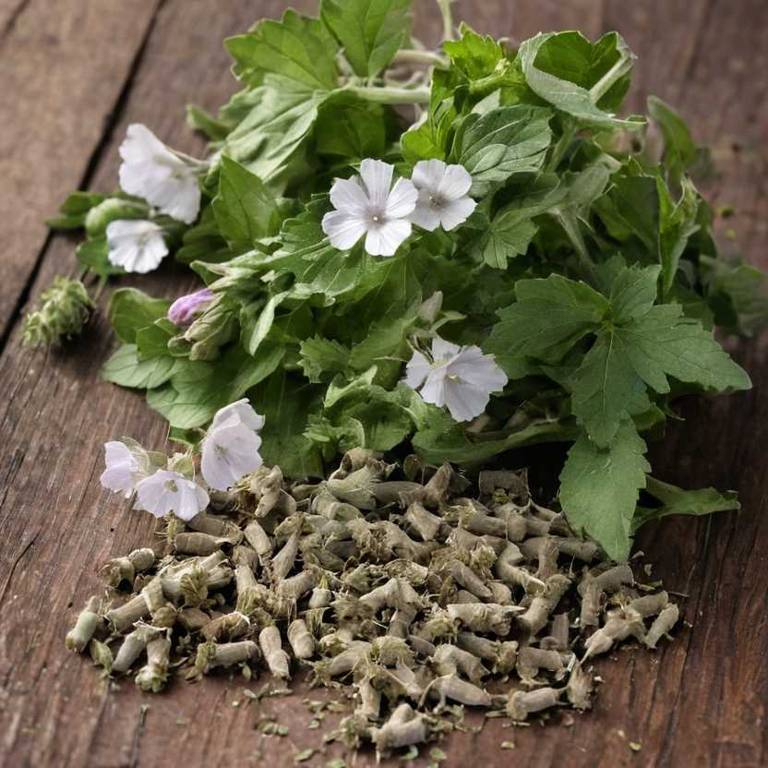Marshmallow (Althaea officinalis)
Marshmallow (Althaea officinalis) is a member of the Malvaceae family, native to Europe, Asia, and North Africa. Traditionally, its roots, gum, and leaves have been used for infusions, decoctions, and poultices.
This herb is particularly valued for its expectorant, anti-inflammatory, and astringent actions, and has a long history of use in european herbal medicine, mediterranean herbal traditions, and japanese kampo medicine.

Quick Facts / Key Information
| Common Name | Marshmallow |
|---|---|
| Scientific Name | Althaea officinalis |
| Plant Family | Malvaceae |
| Genus | Althaea |
| Species | officinalis |
| Native Range | Europe, Asia, North Africa |
| Plant Parts Used | Roots, Gum, Leaves |
| Primary Medicinal Actions | Expectorant, Anti-Inflammatory, Astringent |
| Primary Traditional Systems | European Herbal Medicine, Mediterranean Herbal Traditions, Japanese Kampo Medicine |
| Historical Preparation Methods | Infusion, Decoction, Poultice |
Botanical Identity
- Scientific Name
- Althaea officinalis
- Common Name
- Marshmallow
- Synonyms / Alternative Names
- Althea, Sweetroot, White Mallow
- Plant Family
- Malvaceae
- Genus
- Althaea
Botanical Description
- Growth Habit
- Perennial herbaceous plant.
- Height
- It typically grows to a height of 30 to 100 centimeters.
- Leaves
- Broad leaves with upper surface pale green and lower surface darker green, exhibiting prominent stomatal bands.
- Flowers
- Flowers are actinomorphic, with five white to pinkish petals, arranged in solitary umbels, and have five stamens and a superior ovary with two carpels.
- Stems
- Cylindrical, herbaceous, glabrous, ascending, simple, with nodes and internodes, and bearing opposite, sessile, ovate leaves.
Traditional Uses / Historical Use
Traditional Systems
- European Herbal Medicine
- Mediterranean Herbal Traditions
- Japanese Kampo Medicine
- Traditional Chinese Medicine
Historical Preparation Methods
- Infusion
- Decoction
- Poultice
- Syrup
Medicinal Actions
- Expectorant
- As described in traditional systems, a mild expectorant, in respiratory system contexts.
- Anti-inflammatory
- Historically regarded as a cooling anti-inflammatory, for general calming applications.
- Astringent
- In herbal literature, noted as a moderate astringent, in drying-focused uses.
- Tonic
- In herbal texts, considered a gentle tonic, for foundational support.
Active Compounds
- Tannin
- Plant-derived compounds known for their ability to bind proteins.
- Glycoside
- A chemical class frequently found in roots, leaves, and seeds.
- Flavonoid
- A chemical class commonly identified in plant tissues, especially flowers and leaves.
- Saponin
- A group of glycosidic compounds commonly found in roots, leaves, and seeds.
Modern Research Overview
This section is reserved for future summaries of scientific research related to this plant. As additional verified sources are reviewed, relevant study information will be added here.
Safety & Contraindications
- General Precautions
- Precautionary considerations have been reported in relation to this herb.
- Contraindications
- Available information does not clearly establish contraindications for the use of this herb.
- Allergies
- Allergic reactions associated with this herb have not been well documented.
- Drug Interactions
- Interactions with prescription medications have not been well documented.
- Toxicity
- Available information regarding the toxicity of this herb is limited.
- Pregnancy & Breastfeeding
- There is insufficient evidence to determine the safety of this herb during pregnancy or breastfeeding.
Preparation & Usage Methods
- Infusion
- Plant material is steeped in hot water to extract water-soluble compounds.
- Decoction
- This method uses sustained heat to extract compounds from firm plant structures.
- Poultice
- Fresh or dried plant material is applied externally to the skin.
- Powder
- This method converts dried plant material into a uniform powder.
- Tincture
- Tinctures are liquid extracts produced through alcoholic maceration.
Growing, Harvesting & Storage
Growing / Cultivation
- Soil
- Prefers loamy soil with moderately well-drained conditions. Typically grows best in organically rich soils.
- Sunlight
- Thrives in partial sun. Tolerates full sun to partial shade.
- Watering
- Prefers consistently moist soils. Tolerates periodic dry conditions.
Medical Disclaimer
The information provided on this page is for educational and informational purposes only. It is not intended to diagnose, treat, cure, or prevent any medical condition. Always consult a qualified healthcare professional before using any herb for medicinal purposes.